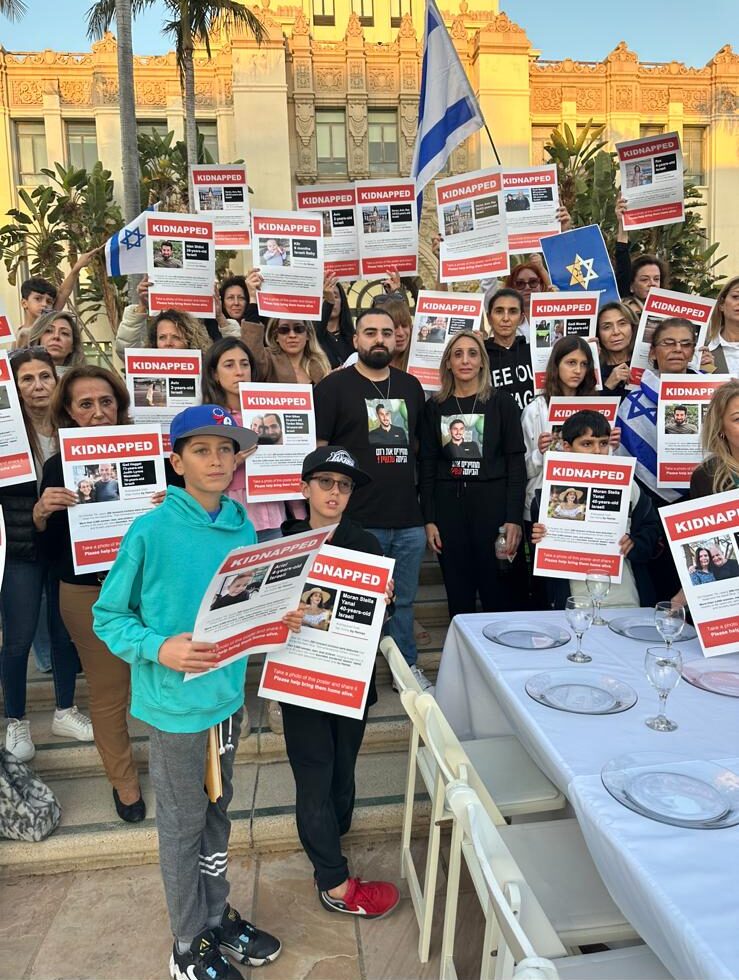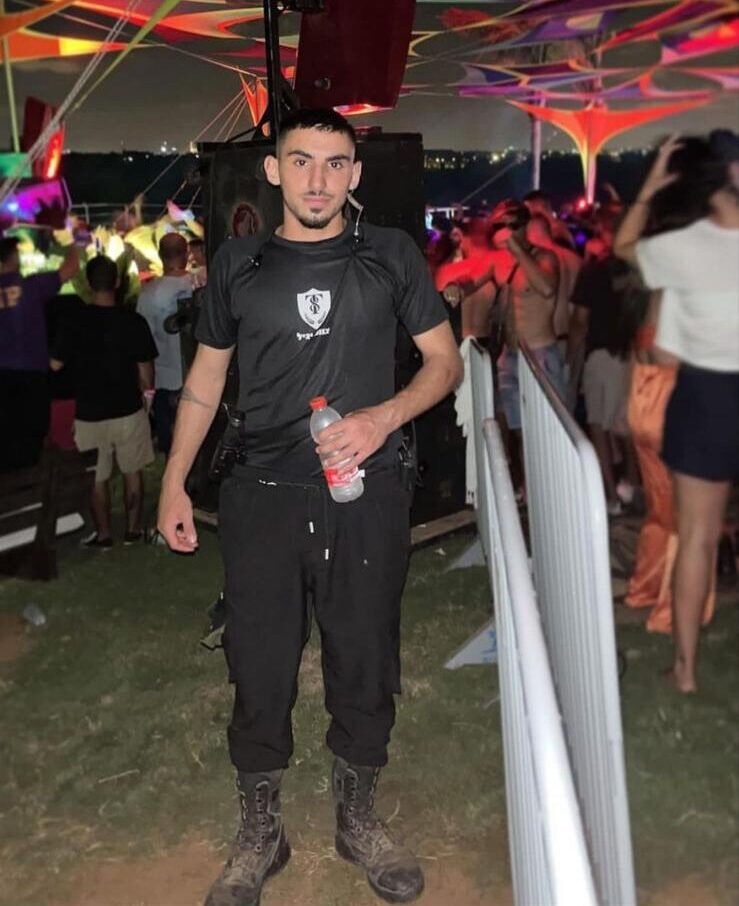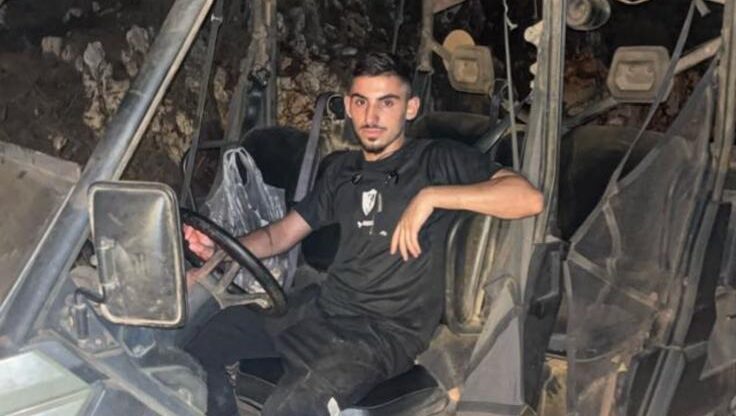Israeli Hostage Uncle Chides Netanyahu: No Hostages, No Legacy
Rom Braslavski was kidnapped from the Nova music festival on October 7, 2023 and has been held hostage for nearly a year and a half. His uncle, Amir Hoshen, is calling for decisive government action to rescue those still held in Gaza.
Weeks after the Israeli government decided to reignite a full-scale war with Hamas, the fate of 59 hostages held by the terrorist organization hangs by a thread. Twenty-four of those hostages are still believed to be alive, including Rom Braslavski, now 21. On October 7, 2023, Braslavski was just 19, working at the Nova music festival as a security guard. He was kidnapped by Hamas while trying to save others.
The Media Line spoke with Amir Hoshen, Braslavski’s uncle, about the family’s efforts to bring the hostages home.
TML: Amir, thank you for this opportunity. First of all, how are you feeling?
Amir Hoshen: It’s been a very tough 18 months. The feeling is like being strangled. We can’t breathe. It’s not just me—it’s the whole family. One person is being held, but there’s a circle of a hundred people who are affected.
Every time something comes up on TV, it hits you again—where is he? What is he eating? We are extremely worried. He’s not captive in an army or a state or someone somewhat reliable. He’s really held by savages, and we are extremely worried about him.
TML: A few hostages were released in the recent ceasefire. How is the family reacting to the fact that Rom was not among the hostages to be freed?
Amir Hoshen: I’m extremely happy for the families. We were all crying. At the same time, we felt a drop in intensity in how we listened to the news. We felt neglected, really neglected by our government and our state—not fighting for all to be back. That’s why we are advocating for all of them to be returned in one shot. So the feeling was mixed, but we are truly happy for the families. They’re our brothers—Jewish brothers.
TML: What do you think of the way the Israeli government has handled the effort to bring these hostages home, both publicly and behind the scenes?
Amir Hoshen: I think they could do a much better job if they focused on it. I’ve seen the back and forth with the assistant to the American president, trying his best to broker something. I think he’s on top of it 100%, while our government is busy with other things—politics, the Ministry of Justice, ministers coming and going.
Life keeps going. And these people are in Gaza tunnels. It’s just not enough. Not good enough. It could definitely be better. It’s up to our government. They can make a decision to bring them all back and solve the Israeli-Palestinian problem some other time.

Rom Braslavski’s family and friends protesting. (Courtesy Hostages and Missing Families Forum)
October 7 has not ended. It’s still going on, and we are at a loss.
TML: Some say the war must go on until Hamas is eliminated, even if this comes at the cost of hostages. How do you see this?
Amir Hoshen: The fact that there are still 59 hostages—most of them alive—is a continuation of October 7. If they return, it’s a win over that horrible date. Until we bring them back, that day remains a failure. There is a way to save October 7, to save some of the Jewish state’s pride and dignity—by bringing them home.
Returning them is a win. If they are back alive, then we won. Because the Israeli-Palestinian issue has been going on for 100 years, it’s not going to be solved tomorrow, with or without the hostages.
This holiday season, give to:
Truth and understanding
The Media Line's intrepid correspondents are in Israel, Gaza, Lebanon, Syria and Pakistan providing first-person reporting.
They all said they cover it.
We see it.
We report with just one agenda: the truth.


Continuing the war is totally understandable. They have no blood relationship with anyone who’s there, so they want to continue the war. They are convinced that the war will bring peace forever, and I don’t blame them. They can advocate for it. I just want all who are advocating for a war to remember that October 7 has not ended. It’s still going on, and we are at a loss. Until we bring them back, we can start a new chapter.
TML: Have you received any proof or signs of life from Rom since October 7?
Amir Hoshen: Something remarkable happened when one of the hostages, Sasha [Troufanov], came back [in February 2025]. On his own, without talking to his family, to Rom’s mom, or to us, he took a picture of Rom and stood in front of a camera, speaking to him as a friend and as a brother. He said in [Hebrew and] Arabic, “I love you. I support you. Be strong. I know you’re there. I know you’re alive. You are brave. You helped me out there.” That was three to six weeks ago. That was a very strong sign of life from Rom.
We literally stopped having joy in our lives
TML: Can you tell us how October 7 played out for you and your family? When and how did you first learn Rom was missing?
Amir Hoshen: I’m in the US, and Rom has two aunts and a grandmother here. We heard it after Shabbat ended on Saturday night. That’s when we first heard he was missing. It was a shock. For three or four days, we didn’t know what was going on. The family just stopped. We literally stopped having joy in our lives. Since then, a lot happened—children were born, his brother had a bar mitzvah—but we couldn’t celebrate. You can’t really be happy when there is this hole, this absence.
TML: Can you tell us more about who Rom is as a person?
Amir Hoshen: He’s a generous, gentle soul. He always helped everyone around him. His friends say his strongest quality is helping others. He’s also incredibly brave. We know he had many chances to run, but he went back to give food or candy to young women who were there. That really shows the kind of person he is.
I met the man who gave him a phone at the scene. Rom grabbed the phone and called his mom at 12:30 and told her, “I’m coming home. Don’t worry.” While bullets were flying, seeing dead bodies, he still found a moment to call and reassure his mom. That’s who he is. We are very proud of him. At 19, I remember myself; I was in the army. My brothers were in the army. We never had to face anything like that.
TML: Israel is now preparing to enter Gaza again with another large-scale operation. What do you hope happens?
Amir Hoshen: My hope is that our soldiers somehow find him and bring him home. That’s really our biggest hope. If they go in, I hope they go all the way and bring him back alive and well.
TML: Do you think it’s possible to bring all the hostages back with a military operation?
Amir Hoshen: Yes. Not because of the military operation but because we believe God watches over the Jewish people. We have very strong faith that it’s possible. It’s not normal or natural—it’s against all odds—but we believe it’s possible.
TML: Still, if you had to choose, would you prefer a deal to guarantee their return?
Amir Hoshen: Absolutely. A deal is the most effective. Our prayers are for everyone to come home through a deal. Definitely, but if the government chooses to go in all the way, then we hope and pray that maybe, just maybe, one of the residents of Gaza will just feel a moment to help him and release him. This is a hope, it’s a prayer, but you know, it’s the only thing we have to hold on to.
TML: How do you feel about the fact that so far, no civilians in Gaza have helped in any way?
Amir Hoshen: It’s so sad. The president of the United States said it. He asked the returned hostages in the Oval Office: Did anyone offer you anything good? Did anyone show compassion? Did a child or a woman give you food or even just wink at you? Nothing. On the contrary—spitting, hitting. It is a very surreal, unbelievable situation where the entire population of Gaza hates the Jews, no matter how they look, what they wear, how they speak.
It’s shocking. We believed there might be civilians in Gaza who wanted peace, but we just see the hate is going over the top. So that makes us worried even more.
A deal will be amazing, will be great. And if anyone who reads your article from Israel is worried about not continuing or finishing the job, we’re talking about a 100-year fight. The hostages are not the reason not to win. We can win—and bring them back.
TML: You mentioned you were in touch with the American administration. Have you personally received this support communication from the US government? And how did it play out?
Amir Hoshen: Rom had a strong connection to the US—two aunts, a grandmother, and me, his uncle, are here. He visited here several times. We even considered bringing him here to study or work. When I met with US officials, I felt they didn’t see him as different because he’s not an American citizen. They care about all the hostages. I truly felt they understood the pain and genuinely wanted to help. They really want to help us. All the hostages. The key is all of them.

Rom Braslavski, working at a party. (Courtesy Hostages and Missing Families Forum)
TML: Do you believe the US could take a stronger stance—not just against Hamas and Qatar, but also in pressuring Israeli leadership?
Amir Hoshen: Definitely. There’s room for more pressure on the Israeli government—not because they don’t want to bring them back, but because they haven’t yet. So yes, more pressure on Prime Minister Netanyahu, on Hamas, and Qatar. I try to explain to them that the real win in this war is the return of the hostages.
TML: What would it be if you could share a message with Rom right now?
Amir Hoshen: I would tell him I’m so proud of him. I love him. We’re all fighting for him. We are 100% sure he’s coming back. Every day that passes, we know he’s one day closer to returning. I would tell him to trust and believe in God—he is with us. He will help us. And he will save Rom along with all 59 people still in Gaza.
If they don’t return—dead or alive—this will forever be remembered. It will remain in your name.
TML: What would you say if you had five minutes with Prime Minister Netanyahu?
Amir Hoshen: I’d say, “Bibi, if you want to be remembered as a great leader, you must bring the hostages back. If they don’t return—dead or alive—this will forever be remembered. It will remain in your name. No matter what else you accomplish, this will stain your legacy. We, the people, know this. And we’ll always remember. You are responsible. And you can still do it.”
TML: Thank you. It is truly an honor.

